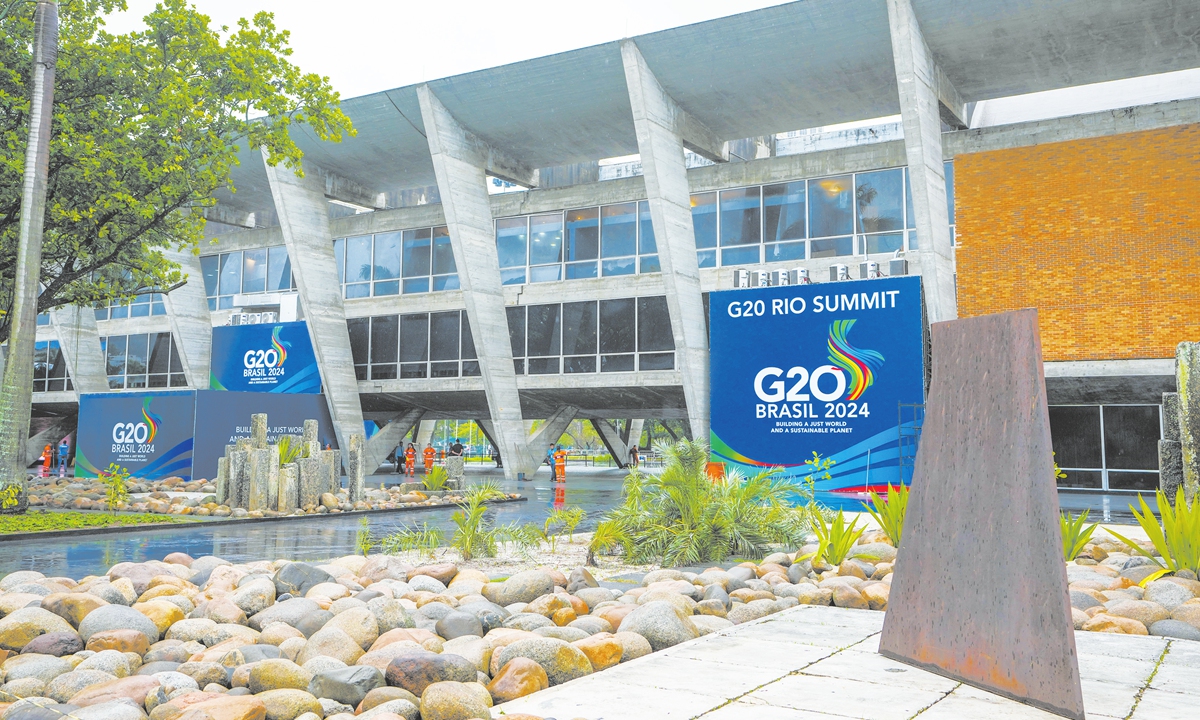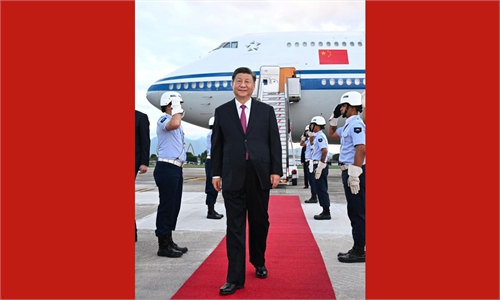Keep G20 focused on shared economic, social goals, free from major power rivalries

Boards are prepared ahead of the G20 Leaders Summit with the theme "Building a just world and a sustainable planet" in Rio de Janeiro, Brazil, on November 16, 2024. Photo: VCG
Editor's Note:
The leaders of the G20 met in Rio de Janeiro on Monday and Tuesday to address major global challenges and crises and promote strong, sustainable, balanced and inclusive growth. How will the Global South's growing voice in the G20 contribute to the global economy and order? How can we address the negative impact that protectionist policies implemented by some Western countries have on global trade? Ronnie Lins (Lins), a Brazilian economist and director of the China-Brazil Center for Research and Business, shared his views with Global Times (GT) reporter Wang Zixuan in an interview.
GT: With Indonesia, India, Brazil and South Africa holding the rotating presidency from 2022 to 2025, how will the Global South's growing voice in the G20 contribute to the global economy and order?
Lins: The G20 Leaders' Summit in Rio de Janeiro represents a substantial opportunity for Brazil and the global landscape. I see this event advancing solid agreements that place social inclusion and sustainable development at the heart of the discussions.
Another critical element of the Rio summit is the leading role of Global South countries in economic governance discussions. With Indonesia, India, Brazil and South Africa holding the rotating presidency, we foresee a more open space for cooperation that more precisely reflects Global South nations' needs and perspectives.
GT: The US and the West have constantly sought to include geopolitical issues in the agenda of G20 meetings in recent years. Some experts have warned that this move politicizes and instrumentalizes the world economy, potentially rendering the G20 dysfunctional. What's your view on this?
Lins: The inclusion of geopolitical issues in the G20 agenda may weaken the group's ability to address major global economic challenges. Established as a platform for economic and financial cooperation, the G20 is distinguished by its ability to bring together leading economies in dialogues that transcend regional disputes and political tensions. When geopolitical conflicts take center stage, the focus on economic, social and environmental issues dissipates, and collective efforts often become mired in power struggles that limit tangible results and hinder progress.
Keeping the G20 focused on shared economic and social goals is crucial to preventing fragmentation and preserving its original purpose. If the G20 becomes a stage for rivalries among major powers, the group risks alienating emerging economies that have much to contribute and are directly affected by global decisions. Rather than fostering strategic alliances, this politicization can create divisions and weaken the G20's role as a mediator of solutions for economic and environmental issues.

Ronnie Lins Photo: Courtesy of Lins
GT: You once mentioned that multilateralism is the most suitable system for today's trade environment, and it will be difficult to achieve ideal economic performance through protectionist policies. How can we address the negative impact that protectionist policies implemented by some Western countries have on global trade?Lins: Protectionist policies adopted by certain countries bring broad and impactful consequences to global trade, with immediate effects that include increased trade barriers and restricted flows of goods and services. When tariffs, excessive subsidies or import quotas are imposed, international competitiveness suffers, harming both exporters and consumers. This reduces the variety of available products, raises prices and initiates a cycle of trade retaliation, creating a situation where everyone loses.
In the long run, protectionism undermines global economic efficiency by limiting companies' access to inputs and markets that could boost productivity and innovation. Such barriers to external competitors often lead to local monopolies or oligopolies, resulting in less innovation and higher production costs.
The impact is even more severe for emerging countries. These nations rely heavily on external markets to export their goods and drive growth, making protectionist barriers from developed economies directly threaten their economic progress. Such barriers restrict access to more profitable markets, compromise development efforts and limit economic diversification.
In the current context, where global challenges demand an integrated response, multilateralism remains the most effective approach to ensuring fair and open trade. This model fosters economic growth and contributes to international stability and resilience.
GT: Brazil's growing interest in the China-proposed Belt and Road Initiative (BRI) has raised increasing concerns in the US. Why is Brazil showing growing interest in the BRI, and how do you view the US' reaction?
Lins: Brazil's interest in the BRI demonstrates its pursuit of economic partner diversification and the opening of new markets for its agricultural and industrial products. By connecting to the BRI network of partner countries, Brazil can strengthen its access to international markets, reduce export costs and advance its strategic infrastructure, enhancing its ability to compete on the global stage.
The US, however, has issued warnings that reflect geopolitical concerns over China's expanding economic influence in Latin America. For the US, which traditionally maintains a strategic relationship with Brazil, involvement in the BRI may signify a shift away from its sphere of influence.
Still, Brazil seeks to carefully weigh the benefits and precautions necessary for alignment with the Chinese initiative. The country views the BRI as a strategic opportunity to broaden its trade and investment networks while recognizing the importance of preserving its economic and diplomatic independence.
The most prudent strategy for Brazil may be to strike a balance, working with China to drive economic growth without compromising its traditional relationships with the US and other Western partners.
GT: Where do you think China-Brazil ties are headed?
Lins: The outlook for Brazil-China relations is promising, with great potential to cement a strategic partnership that benefits both countries significantly. By signaling a commitment to a "long-term strategic partnership" in August, President Luiz Inácio Lula da Silva intends to deepen cooperation in key areas, such as trade, investment, technology and sustainable development.
This offers Brazil a valuable opportunity to diversify its export markets and attract Chinese investments in priority sectors, including infrastructure, renewable energy and technological innovation.
In trade, there is potential for expansion beyond commodities, with a broader range of exported and imported products, promoting an exchange of higher value-added goods. This shift is essential for driving sustainable economic growth in Brazil and fostering a more balanced commercial relationship with China.
Cooperation in innovation and technology also paves the way for Brazil's digital transformation, especially in fields like 5G, artificial intelligence and precision agriculture. With China as an experienced and advanced partner in these areas, Brazil stands to strengthen its competitiveness and accelerate its economic modernization.
This partnership can also fuel collaboration on global issues, such as environmental preservation and the shift toward a green economy. Brazil and China play significant roles in environmental conservation and climate action, and they now have a unique opportunity to jointly develop projects in clean energy and ecosystem preservation. This collaborative model could serve as a sustainable development example, benefiting the two nations and advancing the global environmental agenda.


